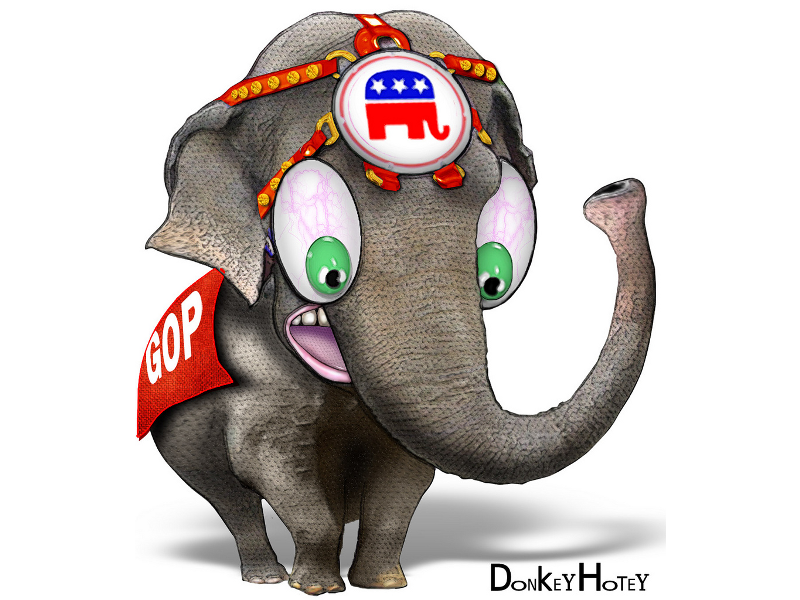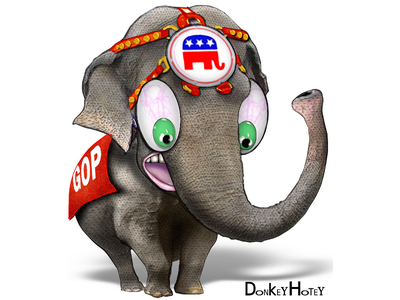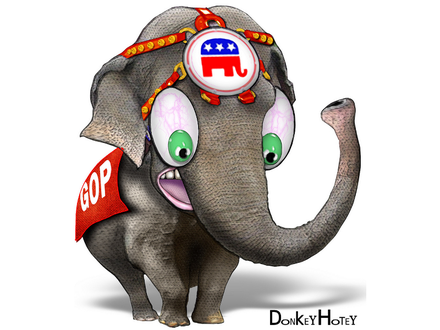

 DonkeyHotey, Attribution-ShareAlike 2.0 Generic
DonkeyHotey, Attribution-ShareAlike 2.0 Generic
This week’s inclusion by Republican Party leaders of a policy plank specifically calling for the reversal of the DOJ’s opinion legalizing online poker brought about a milquetoast response from the leading lobbying organization working on behalf of poker players, the Washington, D.C.-based Poker Players Alliance (PPA).
The attack on online poker by those crafting the GOP’s 2012 policy platform, under the heading “Making the Internet Family-Friendly,” reads as follows:
Millions of Americans suffer from problem or pathological gambling that can destroy families. We support the prohibition of gambling over the Internet and call for reversal of the Justice Department’s decision distorting the formerly accepted meaning of the Wire Act that could open the door to Internet betting. The Internet must be made safe for children.
The specific call to revert to the “formerly accepted meaning” of the 1961 Wire Act refers to the Justice Department opinion late last year that that law, in exact accordance with the language it has contained for a half century, applies only to sportsbetting.
It was only due to gross overreaching by the DOJ that the Wire Act and its successors, the 1978 Horseracing Act and the 2006 UIGEA, were implemented in efforts to stop internet gambling, a practice that the DOJ was forced to cease when it ran afoul of several states’ efforts to sell online lottery tickets.
The DOJ finally adhered to the letter of the law only when legislators, on behalf of their home constituencies, pressured the DOJ to knock it off and enforce the law as it was written. The 2011 DOJ opinion had nothing to do with love or acceptance by the feds of online poker.
Therefore, the GOP policy plank has little chance of affecting the DOJ’s so-called interpretation; it is instead solely an indication of GOP policy on the topic, which has been and continues to be a stance against online poker since the game itself came to be.
So what would you do if you’re a single-issue lobbying organization whose very raison d'être has been slammed by the same party you’ve been courting?
The answer turned out to be… not much. If ever an instant occurred where the PPA should have picked up the phones and screamed to GOP policymakers that they represented a million-plus poker players who knew how to vote, that instant was earlier this week.
Along the way, a proper political shot-over-the-bow would have mentioned the demise of Iowa Rep. Jim Leach, one of the four legislative horsemen of the UIGEA apocalypse, who suffered an unexpected loss in a tight 2006 reelection battle to Dave Loebsack.
Loebsack upset Leach by less than 6,000 votes in a race which analysts subsequently speculated may have tipped due to online poker players upset at the UIGEA’s passage just weeks earlier, led by Leach, Bill Frist, Jon Kyl and Robert Goodlatte. Loebsack carried the Iowa City area alone (home to the University of Iowa, and many online players) by more than 8,000 votes.
The PPA message should have been: “Once in a while, special-interest blocs do matter. Do you really want to antagonize us?”
Instead, the PPA threw its supposed million-plus, special-interest members into the trash, doing its best to not irritate anyone on the GOP side of the political aisle.
Here’s how the PPA really, really let the GOP have it. The core of the PPA’s denunciation reads as follows:
It is unfortunate that the authors of the plank are at odds with many House Republicans who are leading the charge for licensed and regulated online poker, but it is even worse that they are so out of touch with the actual voters.
If a denunciation’s strongest word is “unfortunate,” it’s not much of a denunciation. The PPA’s statement goes out of its way to not irritate anyone, which is the exact opposite of what a single-issue, special-interest group needs to do.
The appeasing non-denunciation continues the longstanding, misguided efforts of the PPA in believing that its political friends come from the right side of the aisle.
If one tracks the PPA’s lobbying efforts over its history, the group has spent most of its time and money attempting to court GOP favor, rather than pursuing Democratic votes.
First there was the signing of Alfonse “Pothole Al” D’Amato as a spokesman, despite D’Amato’s compromised image as a purveyor of any special interest that came along. D’Amato didn’t come cheap, and hasn’t accomplished much.
But the wrongheaded spending goes far beyond that. Most of the group’s lobbying efforts have been targeted at GOP legislators, including the annual purchase of a booth at the American Conservative Union’s Conservative Political Action Conference (CPAC).
That’s right: The PPA has spent years and a healthy chunk of its very limited lobbying budget in trying to get on the good side of folks who want nothing to do with them in the first place.
Maybe they’ve changed a vote or three, but in terms of bang for the buck, one could not do worse. This is core incompetence, regardless of the political climate, a desire to want to act in a certain manner rather than choosing a strategy that’s most effective.
The far right just doesn’t like poker. As noted by Poker Players Alliance VP of Player Relations Rich “The Engineer” Muny, conservative “family” groups have begun a language-based attack against poker, now frequently referring to the game as “poker gambling,” as in the title of a recent Christian Science Monitor piece attacking last week’s United States v Dicristina decision.
The snubs continue, as does the “Right Flight” from anything connected to the PPA. It’s no accident that the call to undo the DOJ’s rightful Wire Act correction was lumped into the same paragraph as a slam against child pornographers.
It turns out that Muny, on behalf of the PPA, had sent a possible position piece carving out an acknowledgement for online poker’s legitimacy to the same GOP policy wonks working on the Republican platform.
Muny’s thoughts went unpublished for three weeks, appearing only the day after the GOP’s anti-poker stance became its formal policy, suggesting the PPA was never to receive more than light lip service in regards to its lobbying efforts.
Then, because poker players themselves seem to have more backbone than the PPA, the topic briefly became the #1 discussion point among visitors to the GOP’s platform-crafting online site.
The GOP’s response was to take down the site itself, even though it was supposed to be up for another month.
Despite the PPA’s fevered dreams, poker remains about as welcome as gonorrhea among conservative policymakers.
Talk this week around the water cooler in pokerfuse’s executive North American offices, on the 71st floor of Chicago’s Willis (formerly Sears) Tower, has revolved around whether or not the proposed Reid/Kyl measure continues to have legs.
I think it’s DOA, though various fuse opinions differ by degree. (And we really don’t have Willis Tower offices.)
My reasons are simple, and tie right back to the fruitlessness of the PPA wasting good resources and banging its head against a wall that’s never going to budge. In short, the GOP is dominated by far-right ideologues to whom “compromise” itself is a dirty word, and the Reid/Kyl bill by its very nature requires compromise to succeed.
Centrist GOP politicians are quitting rather than dare to cross the far-right on issues of importance, such as the “no new taxes” pledge forced upon GOP candidates by Grover Norquist years ago and explored in a “60 Minutes“ expose last year.
What’s left, then, is just that far right, and to expect a freshman senator like Nevada’s Dean Heller to convince a dozen or more of these ideologues to go against their sworn social policies is farfetched. It’s just not going to happen, even if online poker isn’t exactly one of the defining issues of our times.
The icy snub continues an uninterrupted string of policy pushbacks by GOP leaders toward the PPA. While the PPA has achieved some limited success in court cases involving poker, its federal lobbying efforts have returned zero tangible results in over half a decade.
As a legal-advocacy group, the PPA has had some decent results, with Muny himself deserving a special shout-out for services above and beyond to the world of poker. But as a lobbying group, the PPA is an utter failure.
No PPA-backed, pro-poker legislation has ever seriously threatened to pass Congress and reach the President’s desk for a possible signature. The PPA won’t change that perfect mark any time soon.
What’s really needed is a different organization. Let the PPA do its legal advocacy, but let’s have poker develop and support a group that knows when to appease, and when to start waving a stick.

